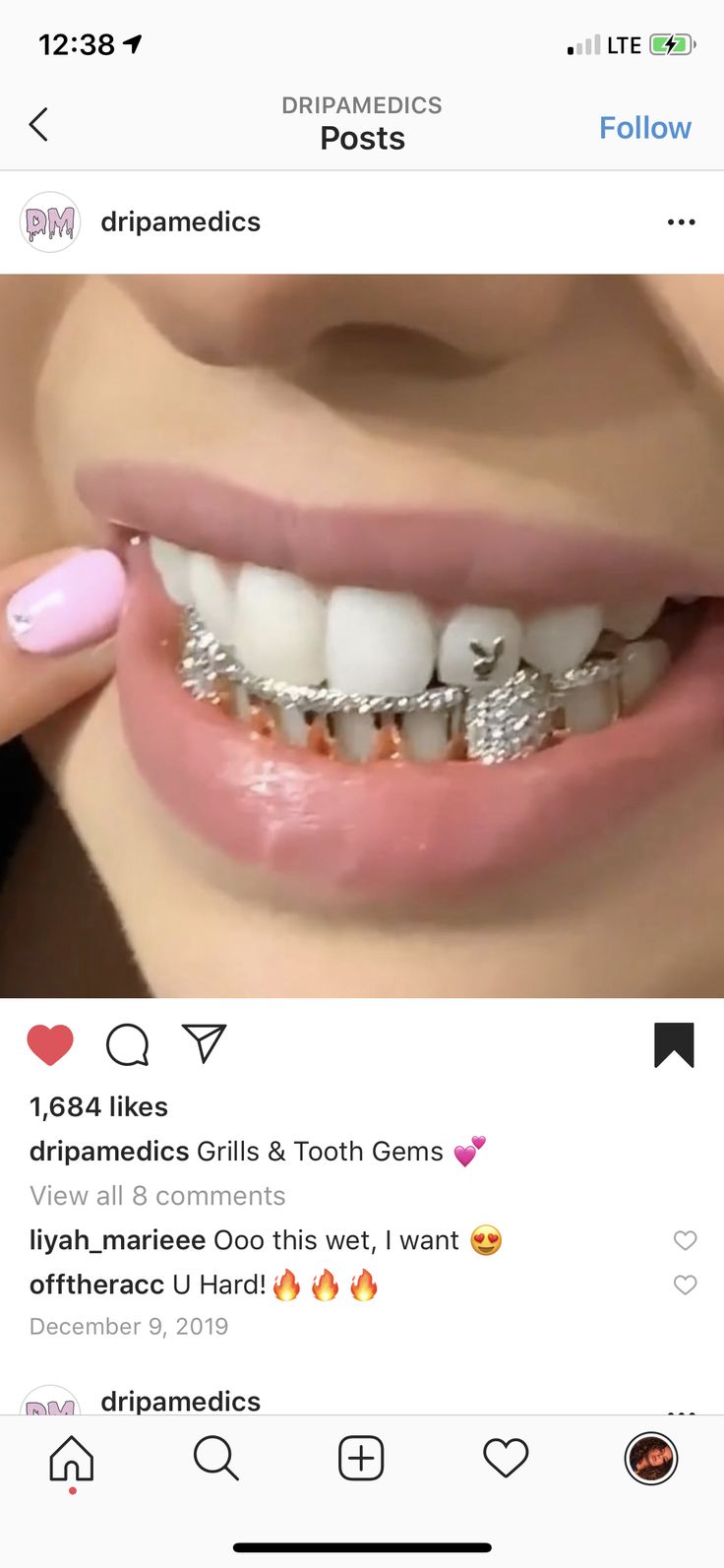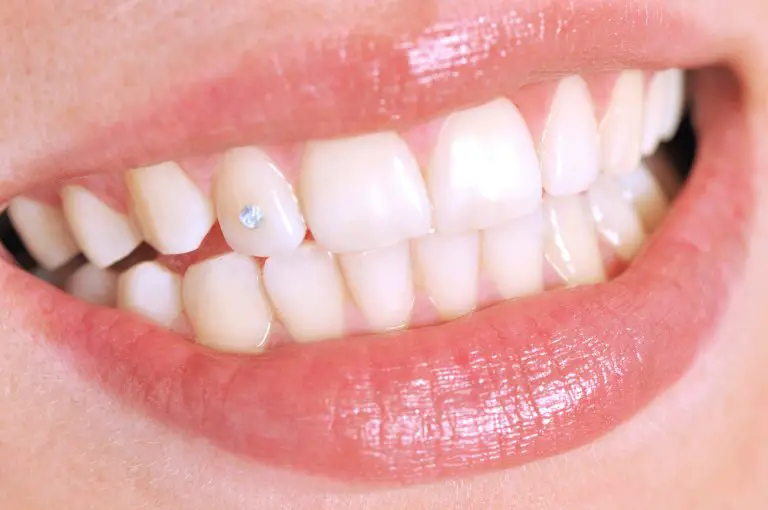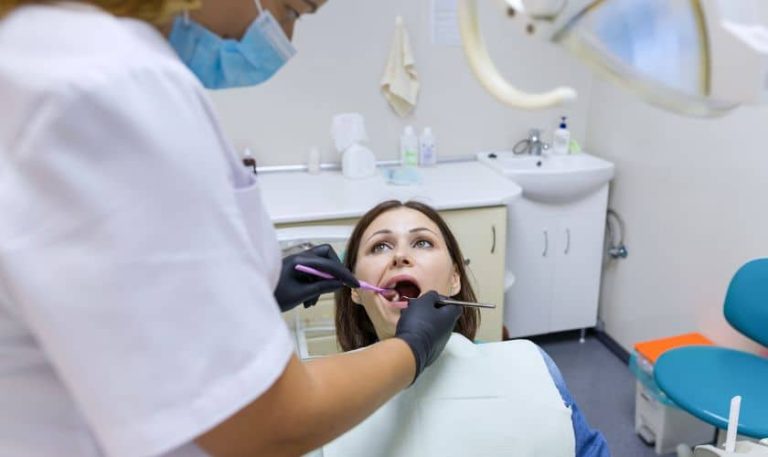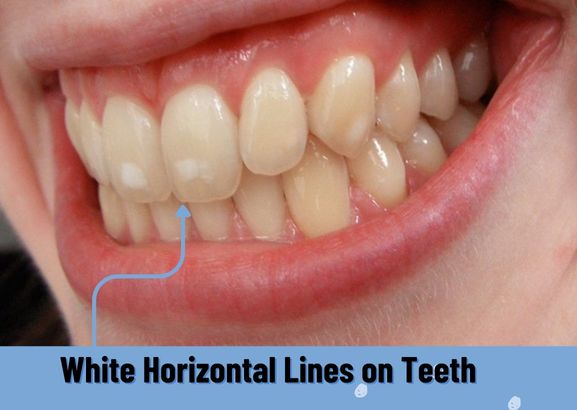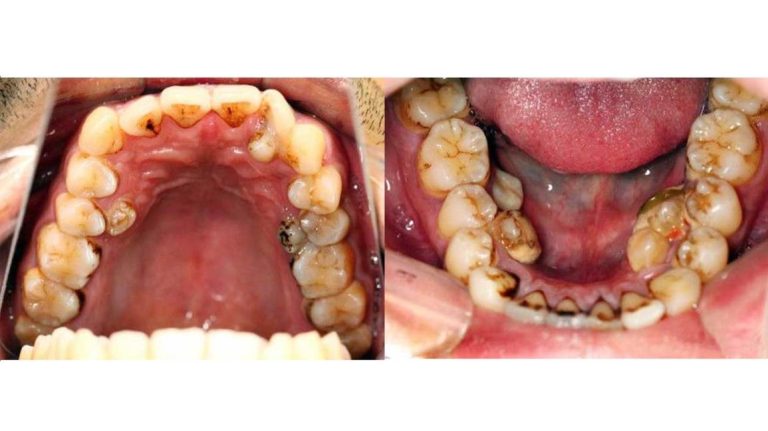Last Updated on 3 days by DR. ALBIN SIPES
Hormonal imbalances can contribute to gum recession by affecting the health of the gums and the body’s response to oral bacteria. Gum recession is the process where the gum tissue pulls away from the teeth, exposing the tooth roots and making them more susceptible to decay and sensitivity.
It is essential to understand the connection between hormonal changes and gum recession to effectively manage and prevent this condition. In this article, we will explore the impact of hormones on gum health, common hormonal changes that can lead to gum recession, and practical tips for maintaining healthy gums during hormonal fluctuations.
So, let’s dive in and learn how to keep your gums in good shape amidst hormonal changes.
Understanding The Role Of Hormones In Oral Health
Hormonal changes can have a significant impact on various aspects of our health, including our oral health. Understanding the role of hormones in maintaining healthy gums is essential for preventing conditions such as gum recession. So, let’s dive into it and explore how hormones can affect our bodies and contribute to gum recession.
How Hormones Affect Different Areas Of Your Body
- Hormones play a crucial role in regulating various bodily functions, including growth, metabolism, and reproduction.
- Throughout a person’s lifetime, hormonal fluctuations occur during different stages, such as puberty, pregnancy, and menopause.
- These hormonal changes can affect different areas of the body, including the oral cavity.
- Hormones can influence the health of our gums, altering their sensitivity and, in some cases, contributing to gum recession.
The Connection Between Hormonal Changes And Gum Recession
- During different stages of life, hormonal changes can lead to an increase in blood flow to gum tissues, making them more sensitive to irritants such as plaque and bacteria.
- Increased sensitivity can result in an exaggerated inflammatory response, leading to gum recession.
- Hormones, particularly estrogen and progesterone, can make the gums more prone to inflammation, making it easier for bacteria to penetrate and cause damage.
- In some cases, such as during pregnancy, hormonal changes can lead to an overgrowth of gum tissue, known as pregnancy gingivitis, which can eventually contribute to gum recession if left untreated.
Understanding the intricate relationship between hormones and oral health is crucial for identifying and addressing the underlying causes of gum recession. By maintaining good oral hygiene practices and seeking regular dental care, we can effectively manage hormonal changes and support healthy gums.
So, let’s take charge of our oral health, especially during times of hormonal fluctuations, and ensure that our beautiful smiles remain vibrant and gum recession-free.
The Impact Of Puberty On Gum Health
During puberty, hormonal changes are not limited to mood swings and physical development. They can also impact oral health, specifically gum health. Understanding the effects of these hormones on the gums is essential for maintaining good oral hygiene during this stage of life.
So, let’s dive into the impact of puberty on gum health.
Hormonal Changes During Puberty And Their Effects On The Gums
- Increased levels of estrogen and progesterone can lead to increased blood flow to the gum tissues, making them more sensitive and prone to inflammation.
- Hormonal fluctuations can cause gums to become swollen, tender, and more susceptible to bleeding.
- These hormonal changes can also result in the development of small, pimple-like lesions on the gums called gingival pyogenic granulomas.
Common Gum Issues Experienced During This Stage
- Gingivitis, an early stage of gum disease, is common during puberty due to the increased blood flow and sensitivity of the gum tissues.
- Swollen gums, bleeding gums, and bad breath are often experienced as a result of hormonal changes during this stage of life.
- Gum recession is another common issue, where the gum tissue pulls away from the teeth, exposing the root surface and creating pockets where bacteria can thrive.
Tips For Maintaining Good Oral Hygiene During Puberty
- Brush your teeth thoroughly at least twice a day using a soft-bristled toothbrush and fluoride toothpaste.
- Pay extra attention to the gumline while brushing, as it is more prone to inflammation during puberty.
- Floss regularly to remove plaque and food particles from between the teeth and along the gumline.
- Rinse with an antimicrobial mouthwash to help reduce bacteria and control gum inflammation.
- Visit your dentist regularly for dental cleanings and check-ups to ensure early detection and treatment of any gum issues.
Remember, puberty is a time of rapid change, and maintaining good oral hygiene is crucial for preventing gum problems. By following these tips and being aware of the hormonal impact on gum health, you can keep your gums healthy and smile confidently during this transformative phase of life.
Hormonal Changes During Pregnancy And Its Effect On Gum Health
Hormonal changes during pregnancy can have a significant impact on a woman’s body, including her gum health. As pregnancy hormones fluctuate, they can increase the risk of gum recession, leading to various gum problems. Expectant mothers need to be aware of these changes and take necessary steps to maintain their oral health during this period.
In this section, we will discuss how pregnancy hormones can increase the risk of gum recession, the symptoms and signs of gum problems during pregnancy, and dental care recommendations for pregnant women.
How Pregnancy Hormones Can Increase The Risk Of Gum Recession:
- Estrogen and progesterone levels increase significantly during pregnancy, resulting in changes in the body’s response to oral bacteria.
- Elevated hormone levels can cause the gums to become more sensitive and prone to inflammation, a condition known as pregnancy gingivitis.
- The increased blood flow to the gums can exacerbate existing gum problems or lead to the development of new ones.
- Hormonal changes can affect the body’s immune response, reducing its ability to fight off gum infections.
- These hormonal fluctuations can ultimately contribute to gum recession, where the gum tissue pulls away from the teeth, exposing the roots and potentially leading to tooth loss.
Symptoms And Signs Of Gum Problems During Pregnancy:
- Swollen, tender, or bleeding gums, especially during brushing or flossing.
- Gum sensitivity or discomfort.
- Redness or darkening of the gums.
- Receding gumline or exposed tooth roots.
- Loose or shifting teeth.
- Persistent bad breath.
- Development of pregnancy tumours, which are non-cancerous growths on the gums.
Dental Care Recommendations For Pregnant Women:
- Regularly visit your dentist for routine check-ups and cleanings, informing them about your pregnancy.
- Practice good oral hygiene by brushing your teeth twice a day with a soft-bristled toothbrush and using fluoride toothpaste.
- Floss daily to remove plaque and debris from between your teeth and along the gumline.
- Consider using an antimicrobial mouthwash recommended by your dentist.
- Maintain a healthy diet rich in essential nutrients for dental health.
- Avoid sugary snacks and drinks that can contribute to tooth decay.
- If experiencing any gum problems or discomfort, seek professional dental care promptly.
By understanding the relationship between hormonal changes during pregnancy and gum health, expectant mothers can take the necessary steps to maintain good oral hygiene and prevent or manage gum problems. Regular dental care and proper oral hygiene practices are crucial for both the mother’s and the baby’s overall health and well-being.
Remember to consult with your dentist for personalized advice throughout your pregnancy journey.
The Menopause Factor: Hormones And Gum Recession In Older Women
Hormones play a crucial role in various aspects of a woman’s life, and their fluctuations can affect different parts of the body, including the gums. In this section, we will explore the relationship between hormones and gum recession during menopause.
The Influence Of Hormonal Fluctuations On Gum Health During Menopause
- During menopause, hormonal changes can lead to a decrease in estrogen levels, which can affect gum health. Estrogen helps to regulate blood flow to the gums and maintain their health.
- As estrogen levels decline, women may experience dry mouth, which can increase the risk of gum infections and gum recession.
- Hormonal imbalances can also lead to a thinning of the gum tissue, making it more susceptible to recession.
Common Gum Issues Faced By Menopausal Women
- Gum recession is a common issue faced by menopausal women. It occurs when the gum tissue surrounding the teeth pulls back, exposing the tooth root. This can lead to sensitivity, tooth loss, and other dental problems if not addressed.
- Menopausal women may also experience gum inflammation and bleeding, known as gingivitis. This is often caused by poor oral hygiene or hormonal changes.
- Dry mouth is another issue that menopausal women may encounter. It can contribute to gum problems by reducing saliva flow, which helps to cleanse the mouth and prevent bacterial growth.
Strategies For Preventing And Managing Gum Recession During This Phase Of Life
- Maintain good oral hygiene by brushing twice a day with a soft-bristled toothbrush and fluoride toothpaste. Flossing daily is also essential to remove plaque and food particles from between the teeth.
- Use a mouthwash specifically designed for dry mouth to help alleviate symptoms and promote saliva production.
- Regular dental check-ups and professional cleanings are essential for early detection and treatment of gum issues. Your dentist can assess your gum health and provide appropriate interventions if needed.
- Consider hormone replacement therapy (HRT) under the guidance of a healthcare professional. HRT can help manage hormonal imbalances and potentially improve gum health.
- Eat a balanced diet that is rich in vitamins and minerals necessary for gum health, such as vitamin C and calcium.
- Avoid tobacco use and limit alcohol consumption, as they can worsen gum problems.
By understanding the impact of hormonal fluctuations during menopause and taking proactive steps to maintain good oral hygiene, women can mitigate the risks of gum recession and ensure better overall gum health during this phase of life.
Hormonal Imbalance And Its Impact On Gum Health
Gum recession is a common dental problem that affects many individuals. While it can be caused by various factors, such as poor oral hygiene and gum disease, one factor that is often overlooked is hormonal imbalance. Hormones play a crucial role in our overall health, and when they are imbalanced, it can have a significant impact on our gum health.
Understanding the correlation between hormonal imbalance and gum recession is essential in addressing and preventing this issue. In this section, we will delve into the signs of hormonal imbalance and how it can contribute to gum problems, as well as explore actions that can be taken to restore hormonal balance and improve gum health.
Let’s dive in!
Tackling Hormonal Challenges For Optimal Gum Health
Hormonal changes in the body can have a significant impact on our overall health, including the health of our gums. Fluctuations in hormones, such as those experienced during puberty, pregnancy, and menopause, can influence the health and condition of our gum tissue.
, it is vital to be proactive and take steps to care for our oral hygiene To maintain optimal gum health during these hormonal challenges. In addition, making dietary changes that promote hormonal balance can also positively impact our gum health.
If you are experiencing hormone-related gum issues, seeking professional help from a dentist or periodontist is essential. Let’s explore some practical tips for maintaining good oral hygiene during hormonal changes, as well as dietary changes that promote hormonal balance and gum health.
And for those who need additional assistance, seeking professional help for hormone-related gum issues can make all the difference. So, let’s dive into these critical areas and discover ways to tackle hormonal challenges for optimal gum health.
Tips For Maintaining Good Oral Hygiene During Hormonal Changes:
- Brush your teeth at least twice a day using a soft-bristled toothbrush and fluoride toothpaste.
- Floss daily to remove plaque and food particles from between your teeth and along the gum line.
- Use an antimicrobial mouthwash to kill bacteria and freshen your breath.
- Consider using an electric toothbrush, which can be more effective at removing plaque.
- Be gentle when brushing and flossing to avoid irritating sensitive gum tissue.
- Schedule regular dental check-ups and cleanings to monitor your gum health during hormonal changes.
Dietary Changes That Promote Hormonal Balance And Gum Health:
- Incorporate nutrient-rich foods into your diet, such as leafy greens, fruits, and lean proteins, to support overall hormonal balance.
- Avoid sugary and processed foods, as they can contribute to inflammation and hormonal imbalances.
- Include foods rich in omega-3 fatty acids, like fatty fish or chia seeds, which can help reduce gum inflammation.
- Stay hydrated by drinking plenty of water, as dehydration can worsen hormonal imbalances and affect gum health.
- Consider adding hormone-balancing herbs and spices to your meals, such as turmeric or maca root.
Seeking Professional Help For Hormone-related Gum Issues:
- If you notice persistent gum issues or changes in your gum health during hormonal changes, consult with a dental professional.
- Dentists and periodontists can provide personalized recommendations and treatments to address hormone-related gum problems.
- They may recommend professional deep cleanings, gum treatments, or referral to a hormonal specialist for further evaluation.
- Regular dental exams are crucial for identifying and treating gum issues early on to prevent further damage.
- Don’t hesitate to communicate any concerns or changes in your oral health with your dental care provider.
By following these tips for maintaining good oral hygiene, making dietary changes that promote hormonal balance, and seeking professional help when needed, you can effectively tackle hormonal challenges for optimal gum health. Remember, taking care of your gums is not only important for your smile but also for your overall well-being.
Frequently Asked Questions Of Hormones And Gum Recession
How Do Hormones Affect Gum Recession?
Hormonal changes, such as during puberty, pregnancy, and menopause, can cause increased blood flow to the gums and make them more sensitive to irritants. This can lead to gum inflammation and potential gum recession.
Can Hormonal Birth Control Contribute To Gum Recession?
Yes, hormonal birth control can contribute to gum recession. Some studies suggest that the increased levels of certain hormones in birth control pills can affect the gums, making them more prone to inflammation and recession.
Are There Natural Remedies To Prevent Gum Recession Caused By Hormones?
Maintaining good oral hygiene, including regular brushing, flossing, and using an antibacterial mouthwash, can help prevent gum recession. Additionally, a balanced diet, reducing stress levels, and avoiding smoking can also positively impact gum health.
Will Hormone Replacement Therapy Affect Gum Health?
Hormone replacement therapy (HRT) can affect gum health. Estrogen, a hormone used in HRT, has been found to have positive effects on gum tissue. However, individual responses to HRT may vary, and it is best to consult with a healthcare professional.
Can Hormone Changes During Pregnancy Cause Permanent Gum Recession?
Pregnancy hormones can increase the risk of gum inflammation and recession. However, with proper oral hygiene habits and regular dental check-ups, any gum recession caused by hormonal changes during pregnancy can often be managed and may not lead to permanent damage.
How Can I Best Manage Gum Recession Caused By Hormones?
To effectively manage gum recession caused by hormones, it is vital to maintain good oral hygiene practices, including regular brushing, flossing, and dental visits. Consulting with a dental professional can help determine the best treatment options, such as scaling and root planing, to address any gum recession concerns.
Conclusion
Hormones play a crucial role in the health of our gums, and understanding their impact on gum recession is vital to maintaining optimal oral health. Throughout this blog post, we have explored the various hormonal changes that can affect our gum health, such as puberty, pregnancy, and menopause.
These hormonal fluctuations can lead to an increased risk of gum disease and gum recession if not correctly addressed. It is essential to recognize the signs of gum recession, such as gum sensitivity, gumline notching, or tooth sensitivity, and seek professional dental care promptly.
Practicing good oral hygiene, including regular brushing and flossing, along with routine dental check-ups, can help prevent and manage gum recession. By staying vigilant, informed, and proactive, we can keep our gums healthy and avoid the potential complications of gum recession.

